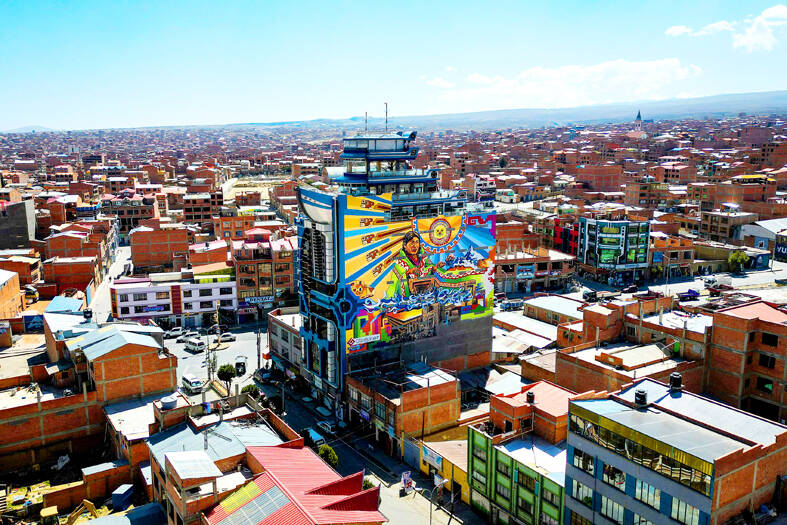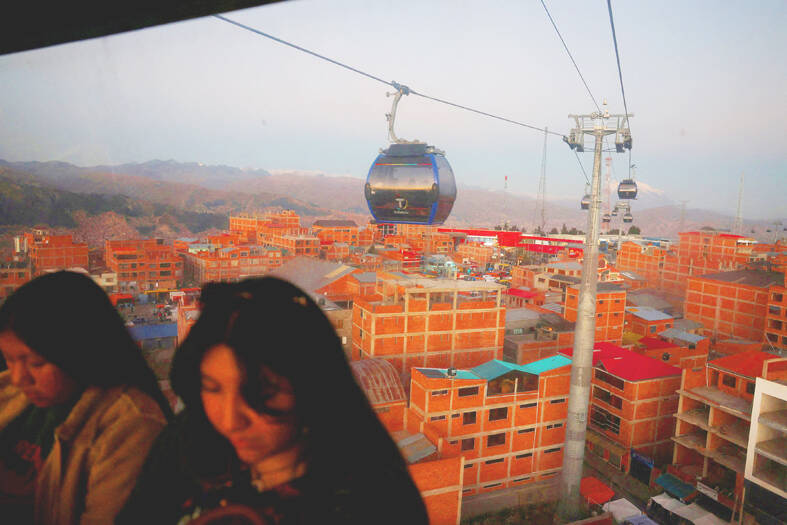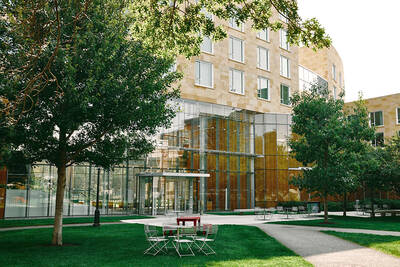A giant cruise ship dominates the skyline in the city of El Alto in landlocked Bolivia, a symbol of the transformation of an indigenous bastion keenly fought over in tomorrow’s presidential election.
The “Titanic,” as the tallest building in the city is known, serves as the latest in a collection of uber-flamboyant neo-Andean “cholets” — a mix of chalet and “chola” or Indigenous woman — built by Bolivia’s Aymara bourgeoisie over the past two decades.
Victor Choque Flores, a self-made 46-year-old businessman, forked out millions of US dollars for his “ship in a sea of bricks,” as he calls his futuristic 12-story palace which looms large over El Alto’s red-brick homes.

Photo: AFP
“It’s a bit like us,” he said, adding that while rooted in the past, indigenous Bolivians are “looking toward the future.”
For many Aymara, that future no longer includes the ruling socialists, who emancipated the indigenous majority over the past two decades.
For the first time since 2005, the political right is expected to triumph in presidential elections as Bolivians ditch the left over a deep economic crisis.

Photo: AFP
FRUSTRATION
Nearly 20 years after former Bolivian president Evo Morales — one of South America’s longest-serving presidents — was elected on a promise of socialist revolution, the Andean country is running on empty.
Widespread shortages of US dollars, fuel and basic foodstuffs have left some Bolivians worse off than before he took over.

Photo: Reuters
Choque Flores still feels grateful to Morales, Bolivia’s first indigenous president, for throwing open the doors of power to the country’s brown-skinned majority.
However, El Alto, a flourishing merchant city, is also increasingly defined by its residents’ desire to simply get ahead.
Accusing the socialists of multiple “failures,” Choque Flores said he was ready to vote for “another political direction,” without revealing which candidate.
GAS WAR
The fate of Bolivia’s left is inextricably linked with El Alto.
Morales came to power in the wake of a bloody crackdown on a revolt in the city over gas exports, which led to more than 60 deaths and the fall of a US-backed president in 2003.
In the years since, Morales repeatedly dispatched his supporters down the mountain from El Alto to the seat of government in La Paz to defend his causes.
However, the winds of change are blowing on the streets of the Andean metropolis, where women in traditional bowler hats, flouncy “pollera” skirts and shawls hawk goods as gleaming cable cars ferry commuters overhead.
Across the million-strong city, walls are covered with leading center-right presidential candidate Samuel Doria Medina’s promise to restore supplies of fuel and US dollars in “100 dias carajo” (“100 days goddammit” in Spanish).
In a sign of the importance of the indigenous vote, Doria Medina, who is running neck-and-neck with right-wing former Bolivian president Jorge Quiroga, staged his final campaign rally in El Alto on Wednesday.
Jonathan Vega, a 25-year-old chef who attended the gathering, said he was counting on Doria Medina to “restore stability.”
A 72-year-old farmer invited to discuss the election at the local “San Gabriel” Aymara-language TV and radio station also backed change.
Arcenio Julio Tancara lambasted Morales’ call for voters to spoil their ballot over the refusal by authorities to allow him to run for a fourth term.
“He has always called for unrest and for strikes and blockades,” he said. “At first, we understood that it might be necessary, but since we’ve seen that it wasn’t for a cause, but simply so that he’d be named leader.”
‘disinfect themselves’
Morales, who is wanted on charges of trafficking a minor, has sought to galvanize his base by warning that hard-won indigenous rights are under threat if light-skinned politicians of European heritage take over.
It is a tactic that plays well with rural Aymara particularly.
“We don’t want to go back to the 20th century,” said Matilde Choque Apaza, the leader of an indigenous and rural women’s association, who wore a colorful “aguayo” hold-all knotted around her neck.
Opposition candidates “clasp [indigenous] hands tightly” when on the campaign trail, but when they get into their cars or go home, “they disinfect themselves,” she said.
She backed the appeal made by Morales for a mass campaign of spoiled ballots to sap the election of legitimacy.
Polls show that about 14 percent of voters are set to answer his call — a far cry from the three outright majorities Morales secured during his 2006 to 2019 rule.
Santos Colque Quelca, a 38-year-old presenter at San Gabriel radio, said that growing numbers of listeners were swearing “never again with Evo or [Bolivian President Luis] Arce” and were switching their support to the “least bad” opposition candidate.
Pablo Mamani Ramirez, a sociologist at UMSA university in La Paz, said Morales’ bid for “eternal” rule ran counter to Indigenous traditions.
“The logic of the Andean world is that power is rotated,” he said.

‘THEY KILLED HOPE’: Four presidential candidates were killed in the 1980s and 1990s, and Miguel Uribe’s mother died during a police raid to free her from Pablo Escobar Colombian presidential candidate Miguel Uribe has died two months after being shot at a campaign rally, his family said on Monday, as the attack rekindled fears of a return to the nation’s violent past. The 39-year-old conservative senator, a grandson of former Colombian president Julio Cesar Turbay (1978-1982), was shot in the head and leg on June 7 at a rally in the capital, Bogota, by a suspected 15-year-old hitman. Despite signs of progress in the past few weeks, his doctors on Saturday announced he had a new brain hemorrhage. “To break up a family is the most horrific act of violence that

HISTORIC: After the arrest of Kim Keon-hee on financial and political funding charges, the country has for the first time a former president and former first lady behind bars South Korean prosecutors yesterday raided the headquarters of the former party of jailed former South Korean president Yoon Suk-yeol to gather evidence in an election meddling case against his wife, a day after she was arrested on corruption and other charges. Former first lady Kim Keon-hee was arrested late on Tuesday on a range of charges including stock manipulation and corruption, prosecutors said. Her arrest came hours after the Seoul Central District Court reviewed prosecutors’ request for an arrest warrant against the 52-year-old. The court granted the warrant, citing the risk of tampering with evidence, after prosecutors submitted an 848-page opinion laying out

North Korean troops have started removing propaganda loudspeakers used to blare unsettling noises along the border, South Korea’s military said on Saturday, days after Seoul’s new administration dismantled ones on its side of the frontier. The two countries had already halted propaganda broadcasts along the demilitarized zone, Seoul’s military said in June after the election of South Korean President Lee Jae-myung, who is seeking to ease tensions with Pyongyang. The South Korean Ministry of National Defense on Monday last week said it had begun removing loudspeakers from its side of the border as “a practical measure aimed at helping ease

CONFLICT: The move is the latest escalation of the White House’s pitched battle with Harvard University as more than US$2 billion is suspended US President Donald Trump’s administration threatened to assume ownership of hundreds of millions of dollars worth of patents from Harvard University, accusing the Ivy League college of failing to comply with the law on federal research grants. In a letter to Harvard president Alan Garber on Friday, US Secretary of Commerce Howard Lutnick said the university is failing its obligations to US taxpayers, paving the way for a process that could result in the government seizing its patents under the Bayh-Dole Act. Harvard has until Sept. 5 to prove it is complying with the requirements, including whether it showed a